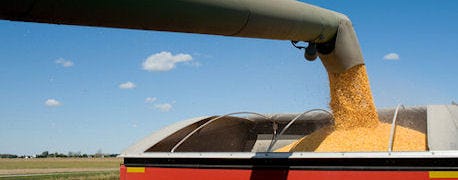November 16, 2012

The Environmental Protection Agency on Friday denied requests to waive the Renewable Fuels Standard, a mandate on the volume of biofuels that must enter the market.
The decision comes after a heated battle among grain and livestock groups that later encompassed several state governors. Livestock groups largely said the drought-caused lower grain yields were driving up costs for feed grain, and demand for the grains for the biofuels market was exacerbating the issue.
Grain groups said the RFS provided an opportunity for energy independence, and built-in flexibilities in the RFS would allow the mandate to function properly, despite concerns about low yields.

EPA denies request from governors, ag groups to waive Renewable Fuels Standard following drought
EPA said it had not "found evidence to support a finding of severe 'economic harm' that would warrant granting a waiver of the Renewable Fuels Standard.
The decision is based on economic analyses and modeling done in conjunction with the USDA and U.S. Department of Energy.
"We recognize that this year's drought has created hardship in some sectors of the economy, particularly for livestock producers," said Gina McCarthy, assistant administrator for EPA's Office of Air and Radiation. "But our extensive analysis makes clear that Congressional requirements for a waiver have not been met and that waiving the RFS will have little, if any, impact."
To support the waiver decision, EPA conducted several economic analyses. Economic analyses of impacts in the agricultural sector, conducted with USDA, showed that on average waiving the mandate would only reduce corn prices by approximately 1%. Economic analyses of impacts in the energy sector, conducted with DOE, showed that waiving the mandate would not impact household energy costs.
Biofuels groups praised the move Friday. American Coalition for Ethanol Executive Vice President Brian Jennings said the decision was no surprise.
"EPA considered the flexibility built-into the RFS, precedent established in 2008, and data which proved waiving the RFS wouldn't remedy the harm of the drought in making the right decision," Jennings said. "Given the battle we anticipate over the RFS in Congress next year, we encourage ethanol supporters to stay engaged."
Growth Energy CEO Tom Buis said a waiver would have also affected the biofuels production industry.
"Granting a waiver on the evidence presented by the obligated parties would have sent the wrong signal the investment community, whose participation is vital to the reducing our dependence on foreign oil, creating jobs in the US that cannot be outsourced, improving our environment and saving consumers at the pump," Buis said.
However, livestock and dairy producers maintain that the RFS is ineffective.
"We are extremely frustrated and discouraged that EPA chose to ignore the clear economic argument from tens of thousands of family farmers and livestock and poultry producers that the food-to-fuel policy is causing and will cause severe harm to regions in which those farmers and producers operate," a coalition of livestock, poultry and dairy organizations said Friday.
National Cattlemen's Beef Association President J.D. Alexander said the denial is a "blatant example" of the flawed policy of the RFS.
"Our message to EPA and Administrator Jackson is how bad does it have to get for livestock producers before relief is brought to rural America? Cattlemen and women are only asking for a level playing field," Alexander said. "With EPA's refusal to grant a waiver when faced with these conditions, it is clear the RFS is not working as Congress intended."
This is the second time that EPA has considered an RFS waiver request. In both cases, analysis concluded that that the mandate did not impose severe harm. In 2008, the state of Texas was denied a waiver.
For more information, click here.
Read more about the RFS debate:
EPA Issues Request for Comment on RFS
USDA Estimates Shake Up RFS Debate
Renewable Fuels Standard, Biofuels Continue to Take Hits
You May Also Like




